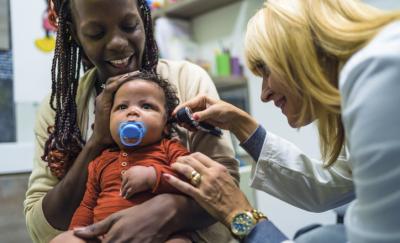Authors
Louise Hadden, Mary Juergens, Gabriella Newes-Adeyi, and Lawrence Reichle, Abt Global; Carmen Sofia Arrioloa, Fatimah S. Dawood, Michael Daugherty, and Kristina Wielgosz, Centers for Disease Control and Prevention; Stephanie A. Irving, Elizabeth Shuster, Allison L. Naleway, and Jillian T. Henderson, Kaiser Permanente Center for Health Research; De-Kun Li, MD, Jeannette Ferber, and Roxana Odouli, Kaiser Permanente Northern California; Flor M. Munoz and Erin Nicholson, Baylor College of Medicine
Unprecedentedly low influenza infection rates were observed in the 2020-21 season, but no studies have estimated influenza testing and infection among pregnant individuals during that period. This analysis of influenza infections among pregnant women produced data consistent with the data in the general population.
The analysis examines the frequency of acute respiratory or febrile illness (ARFI) encounters, influenza testing, and influenza positive test results during the 2020-21 influenza season, which coincided with the COVID-19 pandemic, versus the 2019-20 season, which largely did not. The analysis reviews data from the Epidemiology of SARS-Co-V-2 in Pregnancy and Infancy (ESPI) cohort of pregnant individuals identified using electronic medical records from Kaiser Permanente Northern California, Kaiser Permanente Northwest, and Baylor College of Medicine.
The analysis found that all 107 positive influenza tests—32 percent of the 339 persons tested--were identified between November 2019 and March 2020. No influenza virus infections were identified from 403 tests administered between April 2020 and February 2021, the period overlapping SARS-CoV-2 circulation in the U.S.
The Centers for Disease Control and Prevention funded this study.



